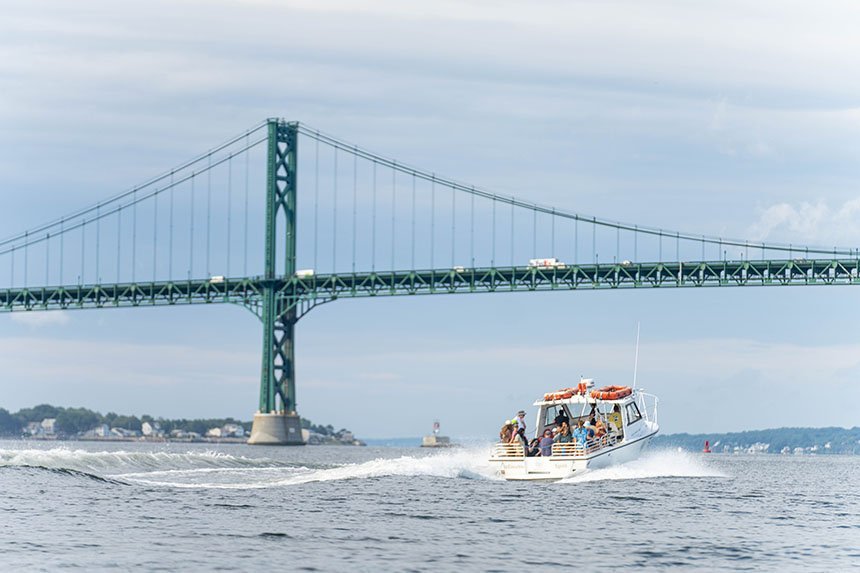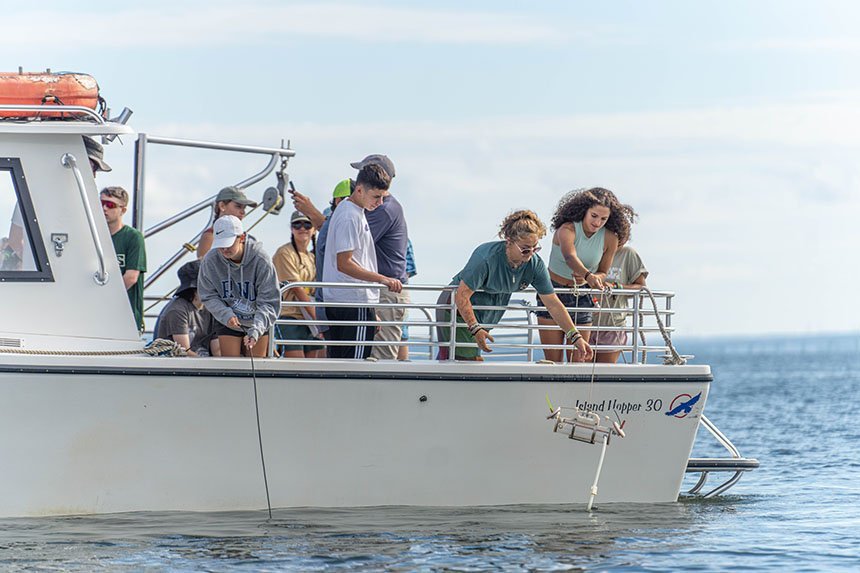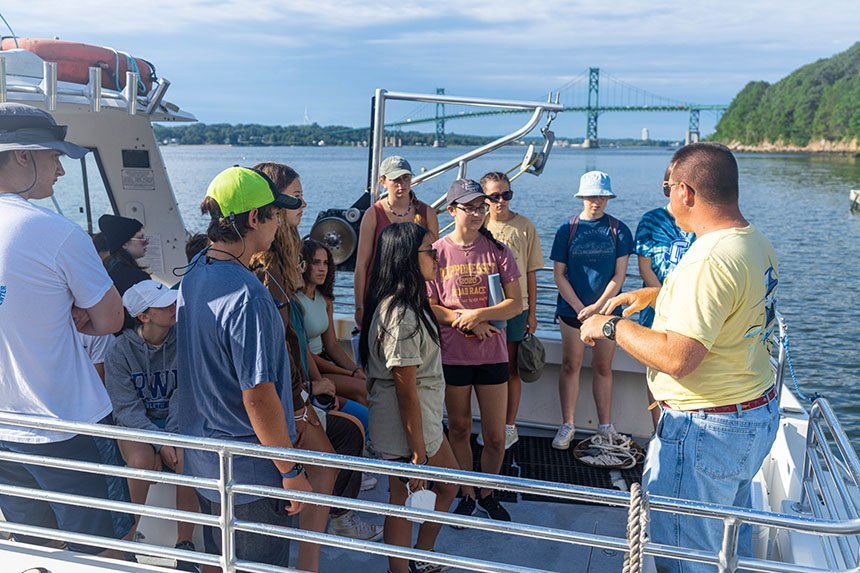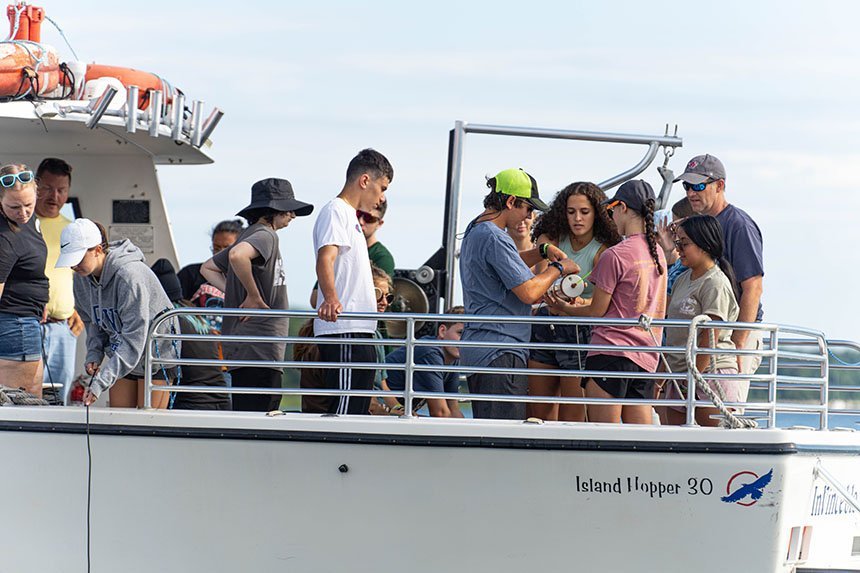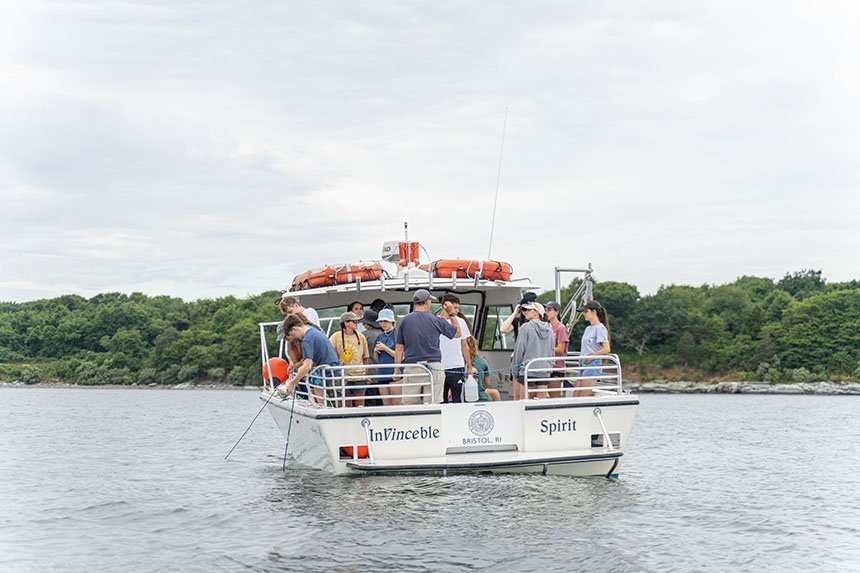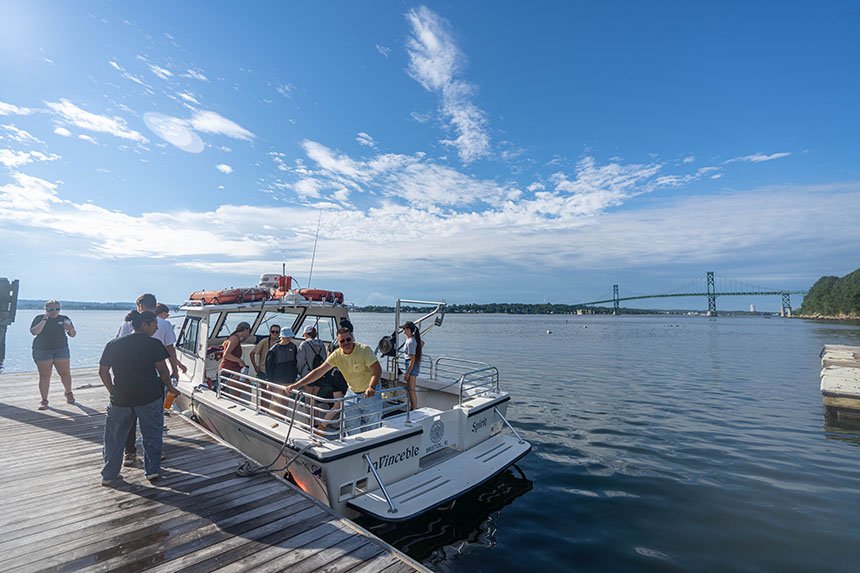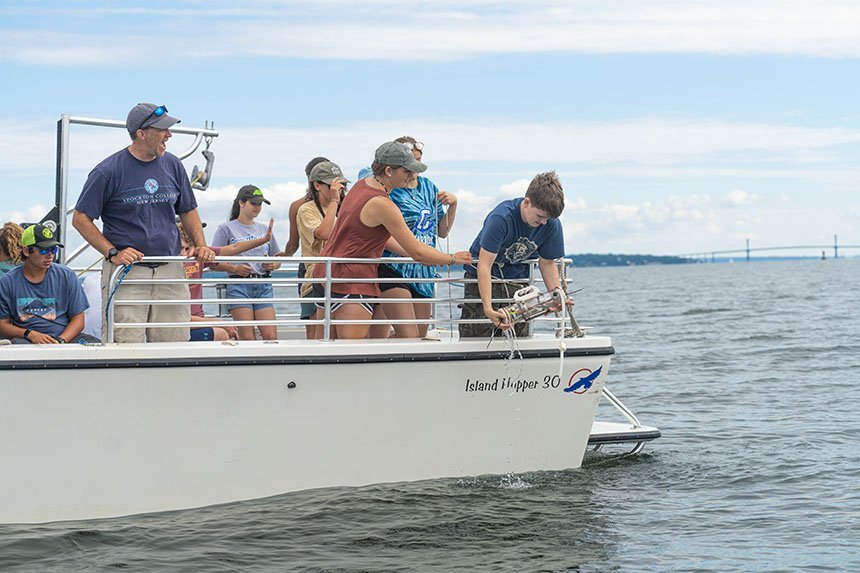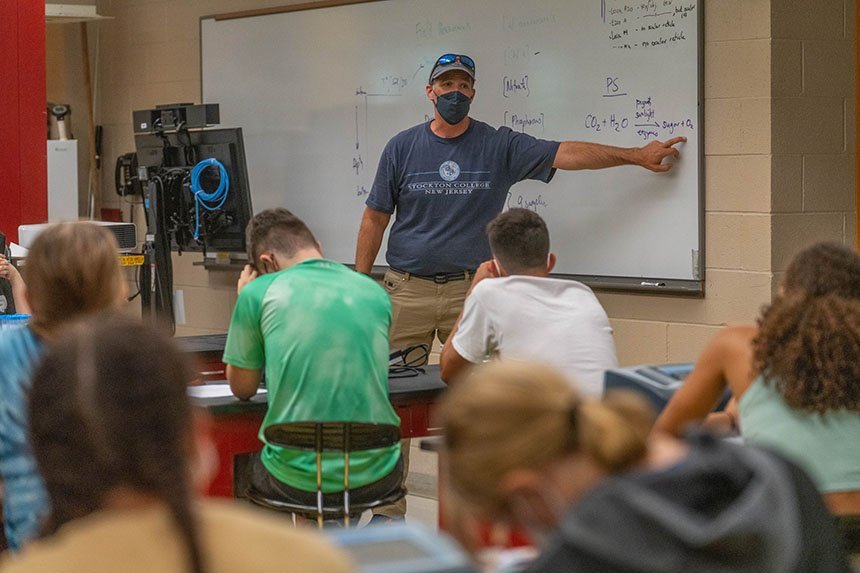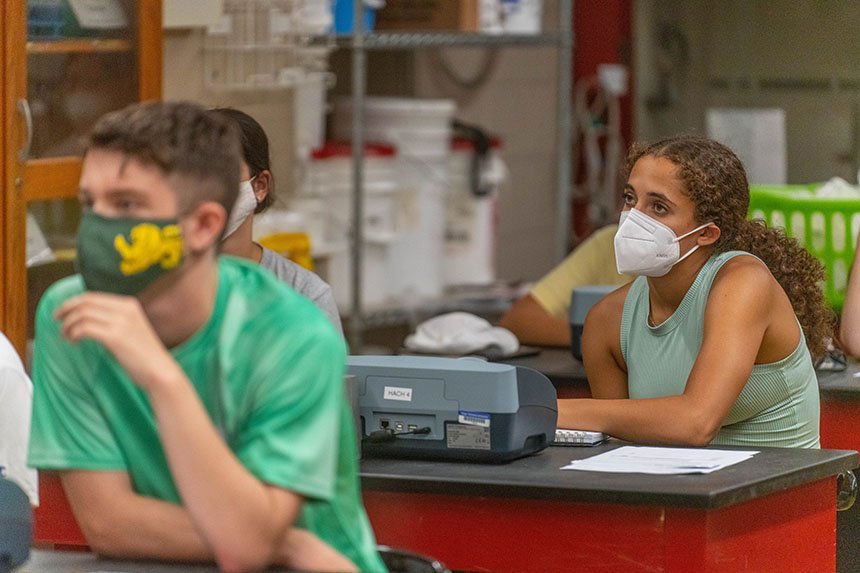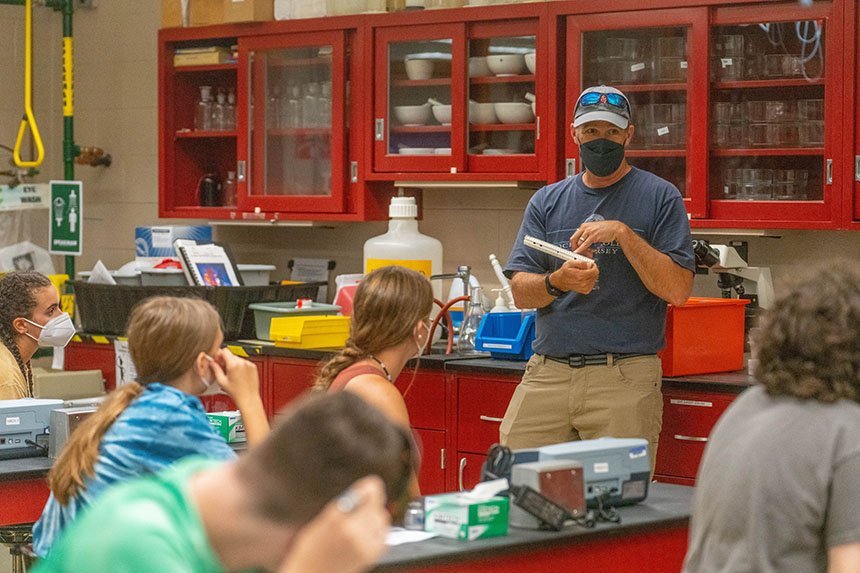RWU Lets High School Students Dive into World of Marine Biology
“Students get exposed to our introductory curriculum,” said Professor Brian Wysor. “We want them to walk away with an appreciation for science.”

BRISTOL, R.I. – On a sunny August morning, 18 high school students from across the country boarded the university’s InVinceble Spirit research vessel and zipped along Narragansett Bay, learning from faculty experts and collecting water samples to bring back to the lab, all part of a Marine Biology camp at RWU.
During the Summer Marine Biology Field Studies Program, high school students take a crash course in Marine Biology by participating in hands-on field excursions and laboratory experiments, and learning about everything from coastal ecosystems and productivity of the sea to plants and animals in the coastal zone, current events in marine biology and much more.
“It’s a weeklong program designed to (highlight) many different facets of Marine Biology and oceanography, so students get exposed to our introductory curriculum,” said program co-director Brian Wysor, professor of Biology and chair of RWU’s Department of Biology, Marine Biology & Environmental Science. “It’s really about exposure: firsthand, up-close, on the boat, handling organisms. We want students to walk away with an appreciation for science, the value of the oceans, and what the human impact is on the oceans, but also what the ocean impact is on humans.”
First held in 1989, the camp is popular and had waitlists for both of its weeklong sessions this summer.
“I like it because it’s a good mix of actual work – doing stuff with purpose – and more relaxed (activities),” said Charlie Griffith, a rising high school senior from Hershey, Penn. “The sole purpose is not only to learn and get stuff done. It’s also a chance to have fun.”

With a campus located right on Mount Hope Bay, RWU’s classrooms are the dynamic, thriving marine environments of the Rhode Island coast, and within a short boat ride or drive are some of the best examples of rocky intertidal, tidal pool, salt pond and barrier beach habitats on the East Coast. “Rhode Island has so much to offer,” Wysor said. “It’s a tiny state with access to lots of different kinds of habitats.”
Inside the state-of-the-art Marine and Natural Sciences building and 3,000-square-foot Wet Lab, students conduct laboratory experiments such as plankton sampling and shellfish and finfish biology.
A 30-foot research vessel, dubbed InVinceble Spirit, is another resource for students. “The fact that we have a research vessel where you can go right out on the water right from the dock and really do hands-on work is great,” said Shawna Chamberlin ’13, camp co-director and microalgae production manager for RWU’s Center for Economic and Environmental Development (CEED). “And the aquaculture program here is insane. It’s one of the best.”
Students attend field trips and learn oceanographic sampling techniques, explore bay ecosystems by sea kayak, snorkel along barrier beaches and tidal pools, view whales during a boat trip off Cape Cod, and identify marine organisms.
“One of the things that we can bring to the experience for the students is the faculty expertise,” Wysor said, and individual attention from RWU faculty and staff is a hallmark of the camp.
Faculty experts volunteer their time to host seminars on Marine Biology topics including marine mammal protection, invasive species, overfishing, toxic plankton blooms, and aquaculture.

“A lot of students come in and have an interest in Marine Biology because they're interested in big charismatic organisms: sharks, whales, dolphins,” Wysor said. “One of the things that's important to me, because I study algae, is making sure that students walk away with an appreciation for photosynthetic life in the oceans as well.”
Showing a variety of Marine Biology career and research possibilities is helpful for students, said Chamberlin, who majored in Marine Biology and minored in Aquaculture and Aquarium Science and Spanish at RWU. “There are so many avenues.”
And it’s great that students can take part in the camp “and then have the potential to come back and attend college here,” she added.
Approximately 20 percent of campers go on to register at RWU. “This might reflect recruitment, or a pre-disposition to attend, but it’s a good number,” said Tim Scott, professor of Biology and director of CEED.
Ella Clohisy, a rising high school senior from Boston, is enrolled in a nursing program at her school and is considering Marine Biology as another option. “This program is a really good intro to see if I want to commit to something,” she said. “It’s been really helpful to see what I want to do.”

For Bridget Church, a rising high school senior from Denver, Colo., attending the Marine Biology camp is a great way to test out her academic interests and see what living on a college campus is all about.
“I want to major in Marine Biology in college, so it’s kind of a taste of what that’s going to be like and making sure that’s what I want to do,” said Church, who works at the Downtown Aquarium in Denver. “I like getting the experience of living on a college campus for a week; I think it’s a really cool experience.”
As part of the program, students sample the college experience by living with a roommate in the dorms on campus and eating in the dining hall. Current RWU Marine Biology students serve as resident staff.
High school students 14 and older with an interest in the aquatic sciences and who have completed at least one high school biology course are eligible to apply. The program is limited to 18 students per session.
“It’s a lot of fun to see the excitement in the students,” Wysor said. “Some of them are seeing things for the first time or things they’ve only seen on TV. That is pretty cool.”

